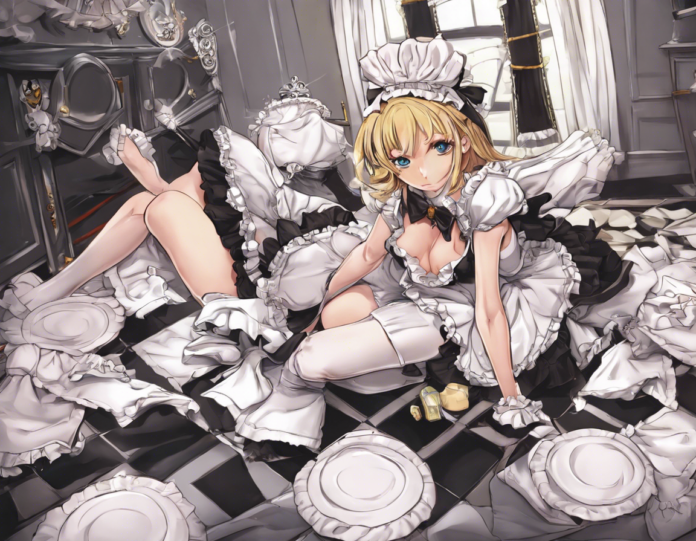Introduction
In the vast realm of classic literature, one of the most intriguing and captivating themes found in many works is that of retribution. Often seen as a form of poetic justice, retribution plays a significant role in many stories, showcasing the triumph of righteousness over evildoers. One such literary piece that embodies this theme is "The Maids' Revenge," a tale that delves into the depths of betrayal, vengeance, and ultimately, redemption.
The Storyline
"The Maids' Revenge" follows the story of two maids, Clara and Louise, who work for a wealthy, deceitful mistress. The mistress, known for her cruelty and arrogance, mistreats the maids and keeps them under her thumb with threats and manipulation. However, Clara and Louise, driven by a fierce sense of injustice and a desire for justice, decide to plot their revenge against their oppressor.
The maids begin by subtly sabotaging the mistress's daily routines, causing chaos and confusion in her household. They orchestrate a series of events that gradually unravel the mistress's carefully crafted facade, exposing her true nature to the world. As the mistress's reputation crumbles, Clara and Louise take bold steps to exact their retribution.
Through a series of cleverly devised schemes and strategic maneuvers, the maids turn the tables on their oppressor, leaving her powerless and humiliated. In a stunning climax, the mistress is forced to confront the consequences of her actions as her world crumbles around her. Ultimately, she is brought to her knees by the very same individuals she once oppressed, facing the harsh reality of karma.
Themes of Retribution and Justice
At the heart of "The Maids' Revenge" lies the theme of retribution. The story explores the concept of balancing the scales of justice, as the maids seek to right the wrongs inflicted upon them by their oppressor. Through their acts of defiance and rebellion, Clara and Louise reclaim their agency and assert their dignity in the face of adversity.
Moreover, the tale delves into the complexities of justice and morality, highlighting the consequences of unchecked power and hubris. The mistress's downfall serves as a cautionary tale, reminding readers of the inherent dangers of oppression and cruelty. In the end, virtue triumphs over vice, illustrating the timeless battle between light and darkness.
Character Development
Central to the narrative are the characters of Clara and Louise, whose evolution throughout the story is crucial to its overarching themes. Initially portrayed as meek and subservient, the maids undergo a profound transformation as they embrace their strength and cunning. Their journey from victim to victor is a testament to the power of resilience and determination in the face of adversity.
Conversely, the mistress serves as a stark contrast to the maids, embodying the tyranny and cruelty that often accompanies unchecked power. Her downfall is not only a result of her actions but also a reflection of her inner turmoil and moral decay. As she faces the repercussions of her misdeeds, the mistress is confronted with the consequences of her choices, leading to a cathartic moment of reckoning.
Lessons Learned
"The Maids' Revenge" offers a compelling exploration of themes that resonate across time and culture. At its core, the tale serves as a powerful reminder of the importance of integrity and empathy in our interactions with others. It underscores the significance of standing up against injustice and oppression, even in the face of seemingly insurmountable odds.
Furthermore, the story highlights the transformative power of forgiveness and redemption, shedding light on the potential for personal growth and healing in the aftermath of conflict. Through the experiences of Clara, Louise, and the mistress, readers are invited to reflect on their own values and beliefs, prompting a deeper understanding of the complexities of human nature and societal dynamics.
In conclusion, "The Maids' Revenge" is a timeless tale that captures the essence of retribution and justice in a compelling narrative. Through its exploration of betrayal, vengeance, and redemption, the story invites readers to contemplate the consequences of one's actions and the power of righteousness in the face of adversity. In a world marked by turbulence and strife, the lessons of "The Maids' Revenge" serve as a beacon of hope and inspiration, reminding us of the enduring allure of literature in illuminating the human experience.
Frequently Asked Questions (FAQs)
- What is the central theme of "The Maids' Revenge"?
-
The central theme of "The Maids' Revenge" revolves around retribution and justice, as two maids seek to retaliate against their oppressive mistress.
-
How do Clara and Louise evolve throughout the story?
-
Clara and Louise undergo a transformation from meek and subservient individuals to empowered agents of change as they plot their revenge against their oppressor.
-
What lessons can readers learn from "The Maids' Revenge"?
-
Readers can glean insights into the significance of integrity, empathy, and standing up against injustice, as well as the transformative power of forgiveness and redemption.
-
What role does the mistress play in the narrative?
-
The mistress symbolizes tyranny and cruelty, serving as a cautionary figure whose downfall underscores the consequences of unchecked power and moral decay.
-
Why is "The Maids' Revenge" considered a timeless tale?
- "The Maids' Revenge" addresses universal themes such as betrayal, vengeance, and redemption, making it relevant across time and cultures for its exploration of human nature and societal dynamics.

